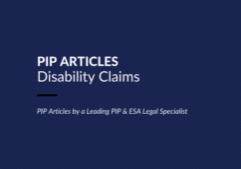PIP Appeal in Central London
Ms S contacted is on 13 May 2019 about her PIP appeal which had been adjourned by a central London tribunal. ~The Department had scored her zero points but she explained that she had mix of physical and mental health problems. There was originally a diagnosis of emotionally unstable personality disorder but this was replaced by one of bipolar disorder and eventually the psychiatrist attributed her problems to Cushing's disease. There was a recent decision to place Mrs S in the ESA support group, which at least was helpful.
It would not be many weeks before her appeal was relisted and we began two days later by going through the PIP test with her to establish where she should have scored points. Our advice was that she should have scored at least 15 points for the daily living component and 14 points for mobility, giving her awards of the enhanced rate of both components. To support our view, we had a letter from her psychiatrist and we took a witness statement from her boyfriend. We requested medical records from her GP, in part because we did not want the tribunal to consider adjourning her appeal again for medical evidence.
On 6 June, we had a letter informing us of the new hearing date of 1 July 2019. We went through the Department’s medical assessment form with the client and found plenty of misunderstandings, omissions and mistakes. We were then able to put together an appeal submission for the tribunal and the first part of this set out what was wrong with the Department's assessment and then went onto explain in detail where she should have scored points and why, introducing references to the PIP legislation, the regulations and to Upper Tribunal decisions that we considered relevant to her case. The client approved the submission and this was emailed to the tribunal office, along with the psychiatrist’s letter, the witness statement and the two pieces of case law we wanted them to think about. As the hearing date approached, the preparation was completed and after chasing the surgery, the medical records finally arrived on the Friday before her hearing on the following Monday. If we had turned up at the hearing with 82 pages of medical records, the likelihood is that the judge would have adjourned the hearing without even glancing at the additional evidence; they would not have been able to deal with that volume. We certainly did not want this to happen and selected 11 pages that we felt was the most relevant. We found nothing negative in the rest of her records, but to put in more would have irritated the tribunal, to say the least.
The client and her boyfriend both attended the hearing and although the judge could see that she was struggling, Mrs S gave her evidence very well. After the tribunal's medical member had finished with her questions, the client asked for a break and we returned to the waiting area. We were ready to go ahead and sent word to the judge, but were asked to wait for a few more minutes before continuing with the hearing I felt that this was very positive sign. The likelihood was that they were discussing whether it they had in fact heard enough and were able to make the award that we wanted. It was a stressful wait but all ended happily with the judge explaining that they had found her evidence earlier to be credible and to be consistent with the medical evidence, as well as the contents of our submission. They felt able to award 13 points for the daily living component, but explained that they had simply stopped once they got past 12 points. In terms of mobility, that they awarded 14 points, for the descriptors that we had included in our written submission. The award dated back to June 2018 and was for three years. That length of award did seem to be appropriate in this case. Allowing six weeks for the Department to sort out the arrears, this gave a period of 61 weeks and the PIP arrears should amount to around £8,900. We explained to Mrs S that because she lives alone and no one has put in a claim for carers allowance for looking after her, her new award of the daily living component of PIP would trigger an additional element into the calculation of her income-related ESA entitlement, called the severe disability premium. This extra £65.85 per week would also be backdated to the start of her PIP claim and an additional £3,900 of arrears can be expected, once she has completed a short ESA form and they have been able to process this. Total arrears of Mrs S should therefore amount to about £12,800 and she was delighted.
Some firms offering a ‘no win-no fee’ option charge a percentage of arrears paid as a result of a successful appeal and 35% of the arrears is not at all unusual. That percentage would have produced a fee for Mrs S of £4,480. The arrangement we made with her was that she would pay £300 to cover out-of-pocket expenses, such as travel, and the balance of our fee would come from her arrears, if the appeal was allowed. Unfortunately, Mrs S has been struggling financially but was able to pay £180 prior to the hearing, which we were content with. We paid out £50 to her GP surgery, being the administration fee to get the medical records that certainly make life easier at the hearing. Our fixed fee would have worked out at 21% of the total arrears that Mrs S will receive, which saved her a lot of money.


 Personal Independence Payments (PIP) and Your Mental Health
Personal Independence Payments (PIP) and Your Mental Health